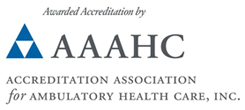Your spine is made up of a stack of individual bones, known as vertebrae, which are separated by spinal discs. These discs are somewhat rubbery in nature and provide your spine with important cushion and shock absorption to protect your spine. While the spinal discs are supposed to be firmly connected to your vertebrae, due to changes in age (disc degeneration), genetic factors or injury, they can move out of place and take on a bulging quality— potentially contributing to a bulging disc, slipped disc, ruptured disc or what is known as a herniated disc. When a herniated disc interferes with or touches nerves or nerve roots, it can be the culprit behind pain in other areas. For example, if the herniated disc is affecting your sciatic nerve, which runs from your lower back, down your buttocks, and into your leg, the results can be pain, numbness or tingling radiating down the leg—potentially even as far as the back of the calf or into the foot.
Do You Have a Herniated Disc?
Herniated Disc Symptoms
Symptoms of a herniated disc can range from the severe: such as crippling pain and extreme difficulty moving to the incredibly subtle, such as herniated disc symptoms like numbness in the hands or feet or muscle weakness. The wide range of herniated disc symptoms and a general misunderstanding of the condition means that there are a number of people who may have a herniated disc without even knowing or suspecting it. However, one of the potential symptoms of a herniated disc, sudden loss of bowel or bladder control, does constitute a medical emergency and should be treated by a medical provider right away.
Most herniated discs occur in the lower back (known as the lumbar spine), though they are also relatively common in the neck (cervical spine) and can technically happen in any part of the spine. The area of the spine in which the herniated disc occurs will influence where symptoms manifest themselves. In addition to a full review of your medical history, a qualified health practitioner will need to conduct a physical exam as well as imaging tests like a CT scan or MRI of the spine to properly diagnose a herniated disc. Prior to making an appointment to discuss any sort of potential musculoskeletal disorder, you will want to be prepared to describe your symptoms as best as you can, including if there is a time of day or certain activity that aggravates your discomfort. This will help direct your provider to the appropriate types of assessments that should be conducted to pinpoint the source of pain or discomfort quickly.
Herniated Disc Treatment
If you do indeed find yourself with a diagnosis of a herniated disc, there are a number of treatment options, depending on the location and severity of your herniated disc. One especially effective step toward managing herniated discs is weight control. Because of the pain associated with the herniated disc, sufferers who are in need of some exercise may find themselves in a bit of a catch-22. However, many patients find that pain-relieving medications, muscle relaxers or epidural injections (under the proper supervision of a licensed health practitioner) can be part of a larger strategy to manage pain before undertaking an exercise regimen. It should also be noted that the way in which a person does heavy lifting may contribute to a herniated disc—lifting with the back rather than the legs, twisting, etc. Talk with your healthcare provider about your particular situation and what type of pain management treatment strategy is best.
Furthermore, physical therapy is an effective treatment option for some patients suffering from a herniated disc. Through physical therapy, a qualified practitioner will be able to instruct you on which exercises will best address your particular condition depending on the exact location of the herniated disc and the associated symptoms. In addition to active physical therapy treatments to increase muscle strength, flexibility, and core stability, your physical therapy to treat herniated discs may include other techniques like massage, hydrotherapy or traction—a technique which involves using gravity to gently separate the vertebrae and relieve disc herniation.
In the event of an extreme case of herniated discs or if other treatment options have been exhausted, a surgical procedure may be necessary. If you have been suffering from back pain, neck pain, numbness or tingling in your hands, feet or other extremities, it may be worth a visit with a practitioner to rule out a herniated disc.
When you have had enough of the symptoms and are ready to identify and treat the underlying cause, contact us for an appointment.




